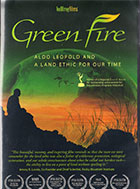
Green Fire: Aldo Leopold and a Land Ethic for Our Time 2011
Distributed by Bullfrog Films, PO Box 149, Oley, PA 19547; 800-543-FROG (3764)
Produced by the Aldo Leopold Foundation, the U.S. Forest Service, and the Center for Humans and Nature
Directed by Ann Dunsky, Steven Dunsky and David Steinke
DVD , color, 57 min.
Middle School - General Adult
Conservation, Environmentalism
Date Entered: 07/09/2015
Reviewed by Cliff Glaviano, formerly with Bowling Green State University Libraries, Bowling Green, OHAldo Leopold (1887-1948) was an American forester, author, scientist, conservationist and environmentalist perhaps best known for his Sand County Almanac, which chronicles the restoration of the natural environment on his farm near Baraboo, Wisconsin. Drawn to the outdoors through a love of hunting and fishing, Leopold graduated from the Yale School of Forestry and served as a forester with the U.S. Forest Service in the Arizona and New Mexico Territories. He transferred to the U.S. Forest Products Laboratory, Madison, WI, in 1924 and was appointed Professor of Game Management at University of Wisconsin in 1933, the first professorship created in wildlife management. In the West, Leopold saw the importance of staying connected to the land, seeing conservation as a means of achieving harmony between humans and the land. Leopold saw great value in preserving the wilderness, proposing the Gila Wilderness Area, the first national wilderness area, but also felt strongly that it was important to bring wilderness near to home through land improvement and restoration. Leopold put his theories of land restoration into practice on an 80 acre rundown farm he purchased, recording his successes in Sand County Almanac, still a key text in environmental science.
Leopold’s story is told through still photos, archival footage and interviews with environmental scientists and Leopold’s children, all of whom followed in his footsteps, becoming prominent teachers and naturalists. Aldo Leopold’s enduring legacy is the land ethic, which he described as the ability “to live on a piece of land without spoiling it,” and conservation as a “state of harmony between men and land.”
Green Fire is highly recommended both as a tribute to Aldo Leopold and to the enduring legacy of his land ethic, the first ethical approach to land conservation and restoration. In a world still strongly divided between those aiming toward land subjugation and those insisting on conservation and restoration, his land ethic establishes a strong philosophical basis for environmentalism. Though the 57 minute Public Television Cut reviewed here is a great introduction to the legacy of Aldo Leopold, both Bullfrog Films and the Aldo Leopold Foundation offer a two DVD set including a longer version of the feature and with additional resources.
Awards
- Emmy Award, Best Historical Documentary, Chicago/Midwest Chapter
- Best Cinematography, Duke City DocFest, 2011